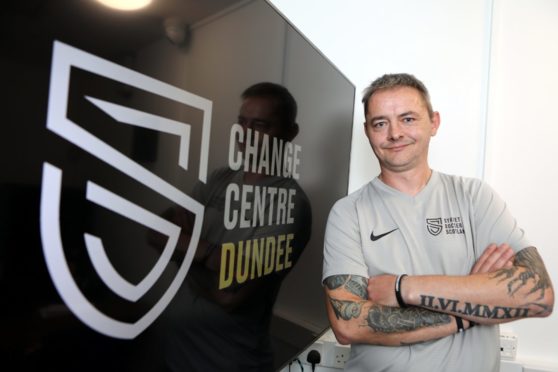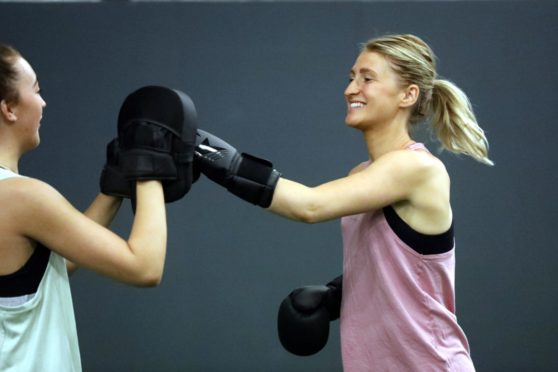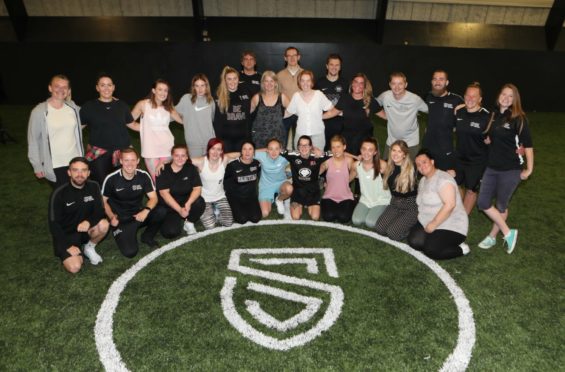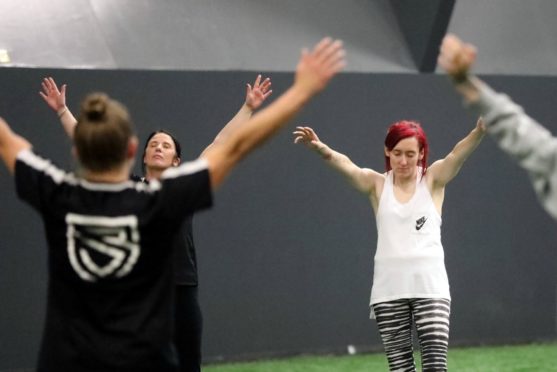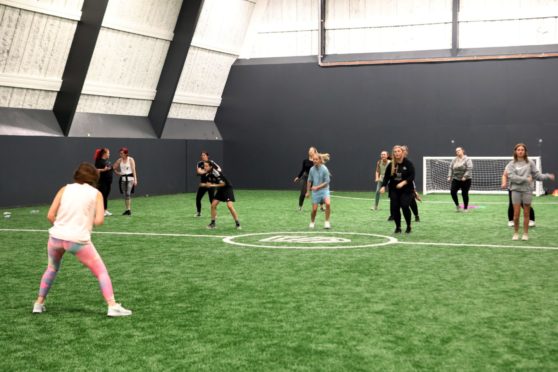“I like the person I am now,” said Mark, a volunteer at Street Soccer Scotland’s new flagship centre in Dundee.
A Dundee local, Mark said he found out about Street Soccer through Andy’s Man Club after having a “massive breakdown” during lockdown.
“I was dealing with a lot – childhood trauma, abuse, rape – and a friend suggested Andy’s Man Club,” Mark said.
While there Mark heard about Street Soccer Scotland and decided to check it out.
“I wasn’t the nicest person in the world, I feel like – I had my own issues and dramas,” he said.
“When I was a kid I was abused and when I was 17 I was raped. Then I joined the army and lots of things happened while I was there.
“I came out and went through a bit of mental health issues.”
After joining up with Zoom calls during Covid, Mark said the second the group went back to in-person visits he joined in right away.
“I’ve never left since,” he said.
Great to have so many players from around the country at @ChangeCentreDun today. We're starting the day with a bit of Yoga 🧘#Street45 pic.twitter.com/yrRuhituT3
— Street Soccer Scotland (@streetsoccerSCO) September 7, 2021
“I’ve never been myself until I got here and got better. It’s like these guys have brought me out of me.
“I’m a different person and I like the person I am now.”
Creating change
Street Soccer Scotland aims to help people struggling with a range of issues such as homelessness, poor mental health and addiction.
Their flagship Change Centre, formerly the Lynch Leisure Centre, is the first of its kind.
The space provides players, their term for service users, not only an area for fitness and mental health improvement, but a range of social services too.
Everyone works on a first name basis so no one is seen to be above one another.
The building has desk space for charities who can provide help with housing, mental health support, and drug and alcohol abuse problems.
They also work with banks Barclay and RBS to help people create bank accounts, which many of the formerly homeless players don’t have access to.
Previously, the charity rented spaces for the clubs and services. Now, they have taken on a 20-year lease from Dundee City Council to run the building.
“It’s called the Change Centre because that’s what we do here – change people’s lives,” business development manager Scott Hollinshead said.
“We’re here to work with the community and bring them in.”
Scott added: “We pride ourselves on being agile – it’s a programme that will naturally evolve. It’s not just this is the project and we stick to it, it’s always going to be growing.”
Giving people hope
“Our aim is to provide people with a bit of hope,” regional manager David MacKenzie said.
“The target groups we work with are very isolated.
“It’s very stigmatic, not just from society on to the individual, but also the individuals’ own self pride.
“It is about engaging people in and developing soft skills like communication, organisation, team working.
“More importantly it’s giving people a platform to know that they’re not alone.”
He added: “It’s a pioneering service which allows us to cut through the political red tape.
“How are people supposed to know about their rights and help available if they don’t know where to find it?
“People don’t know what they don’t know. And we are empowering people to get things that are part of their human rights.”
Working with women
The charity started a women’s only session a few years ago, called Street 45.
Sarah who runs the women’s sessions started at Street Soccer as a player herself.
“We never used to have a women’s only programme,” she said.
Nobody gets through life alone – well all need each other.”
“There is so many barriers for women getting involved in sport – regardless if it’s football or anything else.
“They might feel uncomfortable playing with the guys, running about in front of them. There’s so much and so many levels to it as well.
“That was something that was important to me because Street Soccer has saved my life, having come through it myself.
“We’ve been working really hard to pull together a programme.”
Starting off as an exercise class with footballs, the group didn’t get much interest.
Listening to what people need
After listening to what the players really wanted, the group expanded into other activities, such as yoga, Pilates and boxing.
There are now two halves to the programme – an educational and a physical side.
This allows the women to be supported in both improving mental and physical health as well as gaining new qualifications.
“The women we’re working with have backgrounds of homelessness, mental health difficulties, addiction, prison – social exclusion,” Sarah added.
“They have already faced or are facing all those challenges, so it’s already difficult enough to go engage with services. And even some of those services are 16 to 24.
“We work with 16 plus. It’s so important. I didn’t find recovery until I was 29. It cut out so many opportunities for me.
“People get on their journey at different times and there shouldn’t be barriers in the way of that. If someone doesn’t find recovery until they’re in their 30s, that doesn’t mean they’re any less deserving of the support and help.
“Nobody gets through life alone – well all need each other. And it’s important to provide that platform.
“I watch these women changing their lives every day – it’s incredible.”
